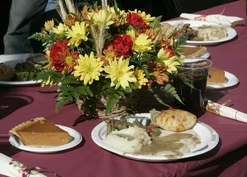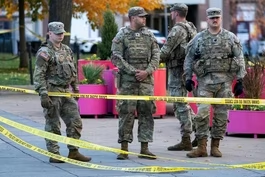
Trump's deployment of National Guard gets renewed scrutiny
Clip: 11/27/2025 | 7m 31sVideo has Closed Captions
Trump's deployment of National Guard in U.S. cities gets renewed scrutiny
The shooting of two National Guard troops near the White House has intensified focus on the Trump administration’s use of military force to crack down on crime in cities led by Democrats. Juliette Kayyem, faculty director of the Harvard Kennedy School’s Homeland Security Project and an assistant DHS secretary during the Obama administration, joins John Yang to discuss.
Problems playing video? | Closed Captioning Feedback
Problems playing video? | Closed Captioning Feedback
Major corporate funding for the PBS News Hour is provided by BDO, BNSF, Consumer Cellular, American Cruise Lines, and Raymond James. Funding for the PBS NewsHour Weekend is provided by...

Trump's deployment of National Guard gets renewed scrutiny
Clip: 11/27/2025 | 7m 31sVideo has Closed Captions
The shooting of two National Guard troops near the White House has intensified focus on the Trump administration’s use of military force to crack down on crime in cities led by Democrats. Juliette Kayyem, faculty director of the Harvard Kennedy School’s Homeland Security Project and an assistant DHS secretary during the Obama administration, joins John Yang to discuss.
Problems playing video? | Closed Captioning Feedback
How to Watch PBS News Hour
PBS News Hour is available to stream on pbs.org and the free PBS App, available on iPhone, Apple TV, Android TV, Android smartphones, Amazon Fire TV, Amazon Fire Tablet, Roku, Samsung Smart TV, and Vizio.
Providing Support for PBS.org
Learn Moreabout PBS online sponsorshipJOHN YANG: The shooting has intensified# focus on the administration's use of the## National Guard to crack down on# crime in cities led by Democrats.
Earlier, I spoke with Juliette Kayyem,## faculty director of the Harvard University# Kennedy School's Homeland Security Project.## She was an assistant DHS secretary during# the Obama administration and oversaw the## Massachusetts National Guard when she was# that state's homeland security adviser.
Juliette, this morning you wrote for "The# Atlantic," where you're a contributing writer,## that this was a terrible and# avoidable tragedy.
Explain that.
JULIETTE KAYYEM, Former U.S.
Department of# Homeland Security Assistant Secretary: Well, for## the last several mon.. there's been a number of assessments by# the military, including the commanding## officers of the National Guard, that these# units were essentially sitting targets,## that they were vulnerable to nefarious# actors, whether criminals or terrorists.
And there was growing concern about this# within the National Guard.
Part of that## had to do with that they were fully# clothed, that they were in uniform,## that they were visible to someone who may# want to harm them, but that their mission,## right, either walking the streets,# doing beautification programs,## just sort of paying attention, which generally# was the mission, was nebulous enough to make it## very difficult to protect them in the way that you# might protect troops either in a war or on a base.
JOHN YANG: The president almost# immediately announced he's sending## 500 more National Guard troops to Washington.
JULIETTE KAYYEM: Yes.
JOHN YANG: Is that a solution?
JULIETTE KAYYEM: It's really not.
I# mean, it's a sort of fallacy to think## more is better, especially when it comes# to deployments anywhere by the military.
The question isn't really about whether# the force can be protected.
The question## is whether the mission -- what the mission is# and how it is defined.
Then you can figure out## what force protection is about.
The president, as# we all know, wanted the National Guard in D.C.,## despite decreasing crime rates there, because he# viewed it as a war zone or too much crime there.
We now know, over the last couple months,## these National Guard units have been really been# used for roaming patrols, visibility patrols, or,## in many instances, sort of landscaping,# picking up trash.
None of that's bad,## per se, but none of that is unique to the National# Guard, nor is it what they're trained to do.
And it's in that sort of gray area# that you create these vulnerabilities,## as we saw for the National Guard.
Adding# more doesn't really solve the problem of,## what is the mission and how is it defined# for the troops, who we all want to protect?
JOHN YANG: Talk about a little bit# about that, what's the mission?
JULIETTE KAYYEM: Yes.
JOHN YANG: Is th.. JULIETTE KAYYEM: No.
I mean, I have worked# with the National Guard all my career.## The National Guard supports civilian efforts in a# disaster or in a homeland or is deployed abroad.
This, as we all know, is a unique, and some# say illegal use by the president of the## National Guard in D.C.
The National Guard# is essentially federalized automatically.## It reports to the president.
And so# the deployment of the National Guard,## a unit that's not trained, units that are# not trained to work in civilian areas and## urban areas as armed, without any# standards of what the metrics are.
Like, what is success for this mission?
All# of that creates sort of a loose understanding## of what the mission is, the potential# for mission creep, and then, of course,## vulnerabilities because there is# no notion of force protection.
I mean, I sort of describe it as like neither# war nor peace.
The politics have thrust the## National Guard into this gray zone that they're# not built for, but that has made them vulnerable.
JOHN YANG: Administration officials are making# much of the fact that the alleged shooter entered## the United States under a Biden era program# for Afghans who were fleeing the Taliban,## and that he was never vetted, that there were# no background checks.
What do you say to that?
JULIETTE KAYYEM: What we understand now is that## the alleged shooter had actually# a number of vetting moments.
Some occurred in Afghanistan.
What the# CIA director, the present CIA director## is saying now is that he did assist the# CIA.
We don't know in what exact capacity,## but that he was assisting in intelligence# and intelligence gathering efforts.
He then is brought to the United States as# Kabul is falling in a special visa program.## That does not grant permanent status.
It# was just a program that brought people in.## They are then vetted during that process.
And# then, again, as he's regularizing his process,## he was granted asylum under the# Trump administration this year.
There is another vetting process.# So, at three different moments,## he's examined by the United States, and either# they missed something or something happened## since he was granted asylum a few months# ago that radicalized him relatively quickly.
So I think it's premature to say this# administration was wrong and this one's right## or that agency was wrong and this one's right.# I think we don't know.
But what we do know is,## he's had strong ties to the United States# for much of his life during the Afghan war,## and only -- and in the last# couple of months, at least,## as he was granted asylum, he then begins# to plan at least an attack on the National## Guard that no one quite knows -- no one# can explain that yet, as far as we know.
JOHN YANG: The administration has paused# immigration from Afghanistan.
And they## also say they're going to reexamine# all the asylum grants under the## Biden administration.
What do you make of that?
JULIETTE KAYYEM: I think, in some ways, the Trump# administration doesn't quite know what happened,## and so they want to look and see# whether this Special Immigrant Visa## program that allowed Afghans to come in who# supported us during the war is picking up## the right sort of metrics for radicalization.
That might be necessary at this stage, but the# idea that you're going to pause indefinitely all## Afghans who have come to the United States# or their ability to come here permanently I## think is at this stage sort of overblown and# also undermines our attempts to support the## Afghans who were so instrumental in# supporting us during the Afghan war.
This is one person who did something absolutely# heinous.
We need to find out how we either got## through the vetting process or what happened# in terms of radicalization more recently.
But## the notion that this is about all Afghans# is one that is undermined by the reality.
Most Afghans are here lawfully and here because# they supported our war effort in Afghanistan.
JOHN YANG: Juliette Kayyem, thank you very much.
JULIETTE KAYYEM: Thank you.
How to navigate challenging conversations this Thanksgiving
Video has Closed Captions
Clip: 11/27/2025 | 9m 47s | How to navigate challenging conversations this Thanksgiving (9m 47s)
Trump tries to put his stamp on the NFL, with mixed results
Video has Closed Captions
Clip: 11/27/2025 | 7m 20s | Trump tries to put his stamp on the NFL, but gets pushback from some fans (7m 20s)
What we know about the National Guard shooting suspect
Video has Closed Captions
Clip: 11/27/2025 | 5m 33s | Investigations of National Guard shooting reveal suspect worked for CIA in Afghanistan (5m 33s)
Providing Support for PBS.org
Learn Moreabout PBS online sponsorship
- News and Public Affairs

FRONTLINE is investigative journalism that questions, explains and changes our world.

- News and Public Affairs

Amanpour and Company features conversations with leaders and decision makers.












Support for PBS provided by:
Major corporate funding for the PBS News Hour is provided by BDO, BNSF, Consumer Cellular, American Cruise Lines, and Raymond James. Funding for the PBS NewsHour Weekend is provided by...


